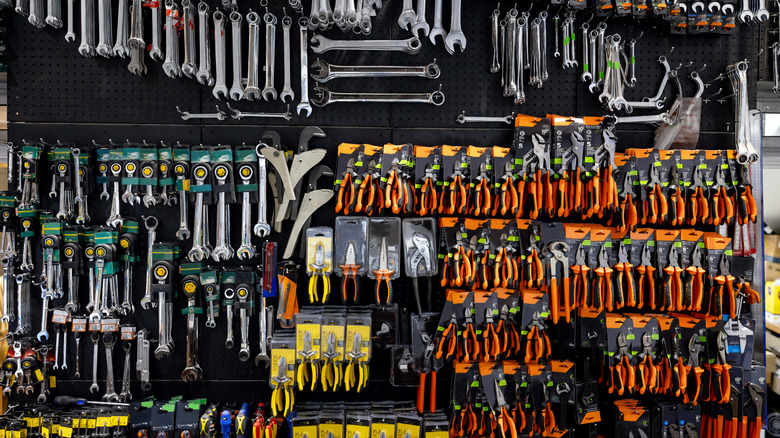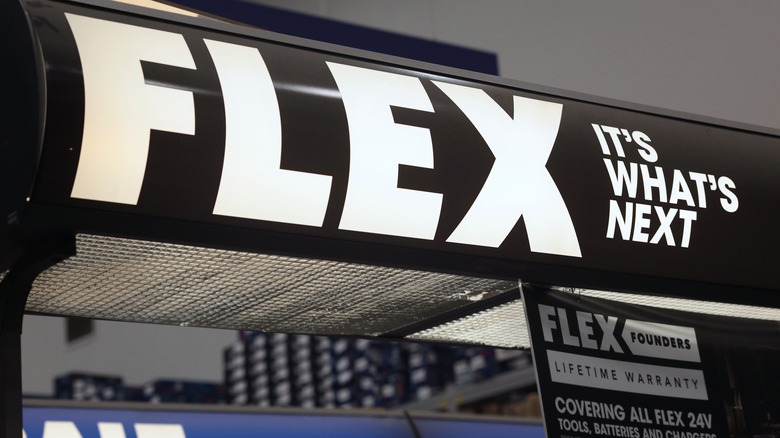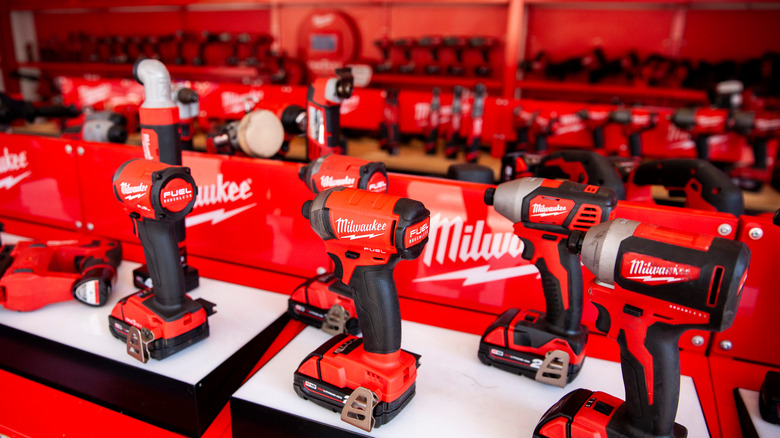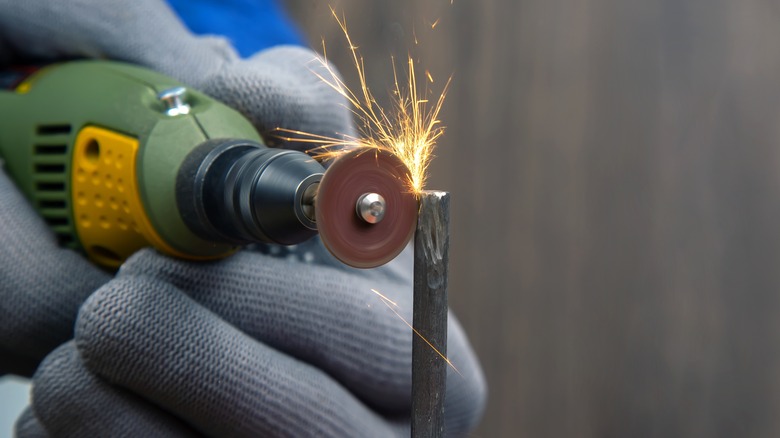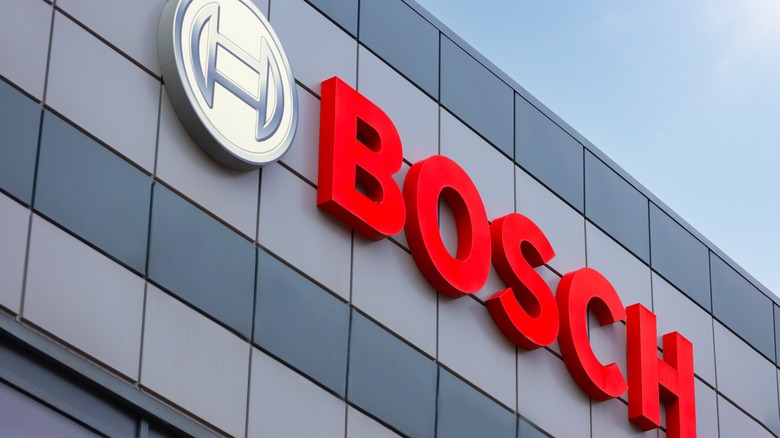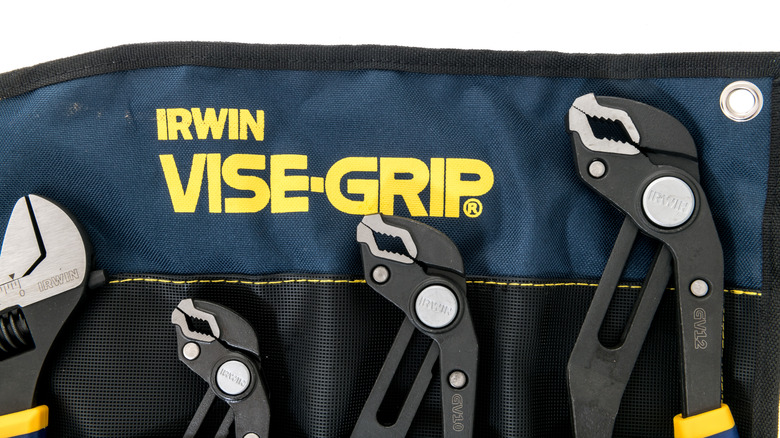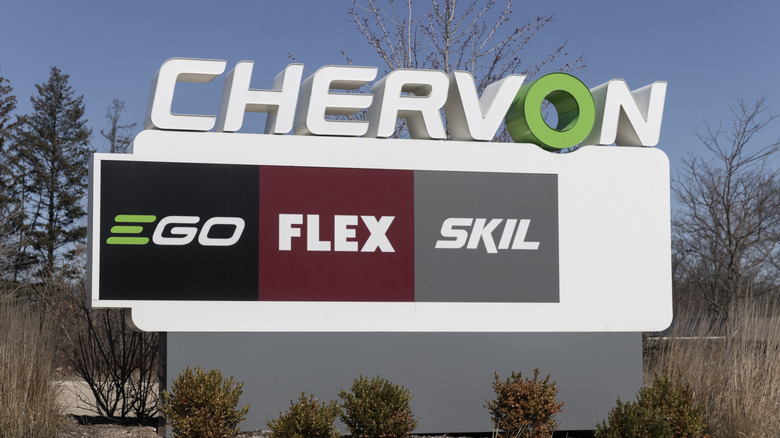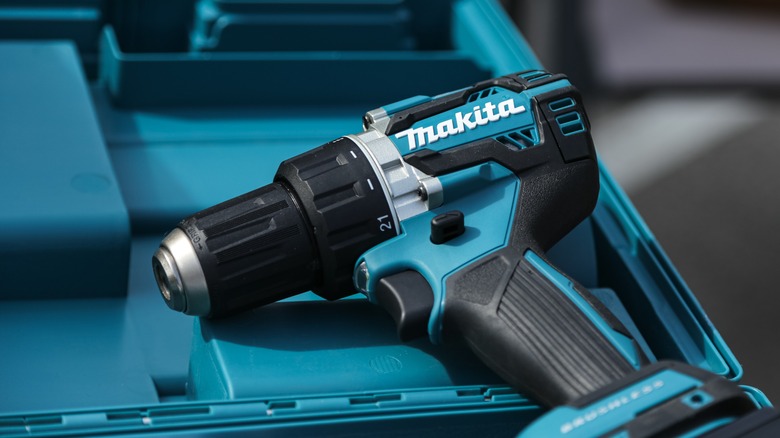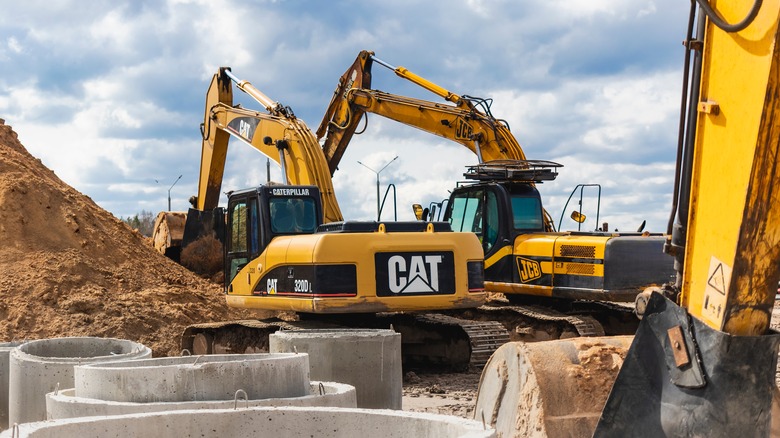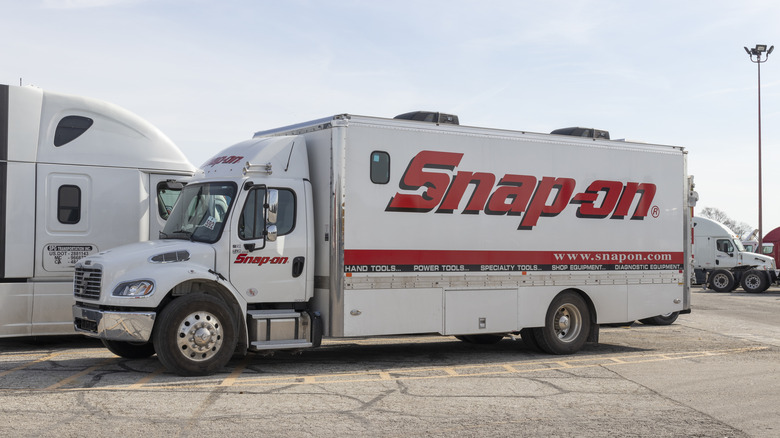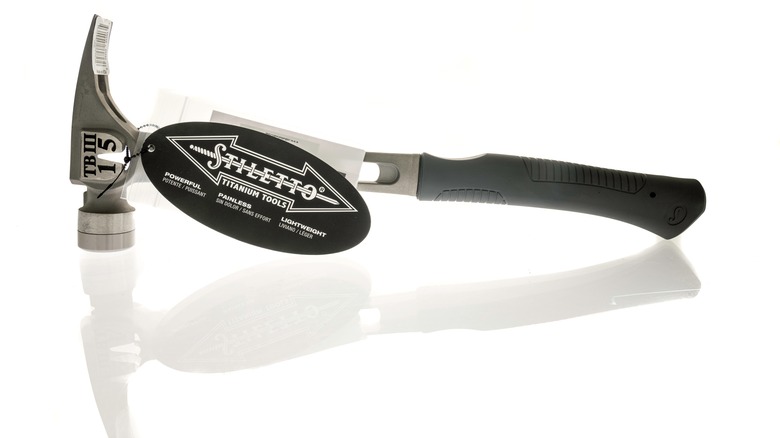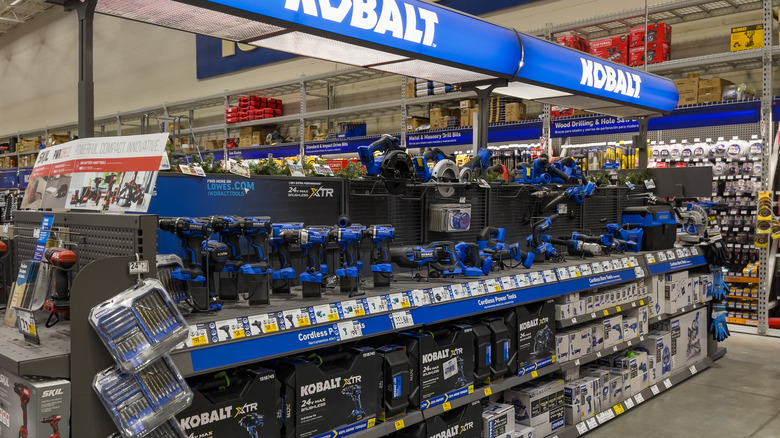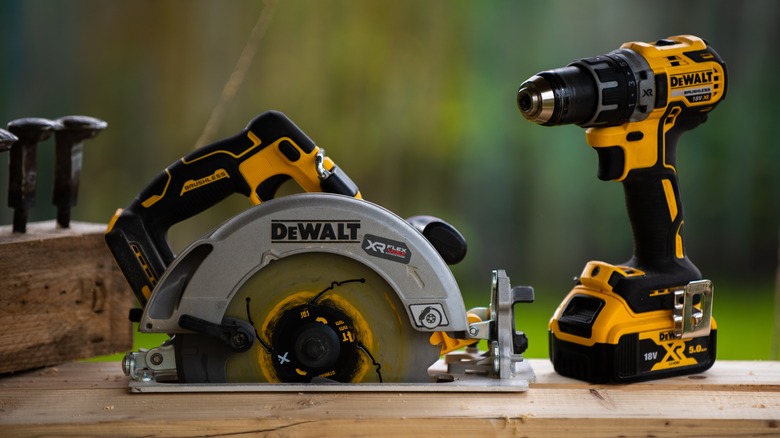The Real Owners Behind All The Major Tools Brands
Tool brands are often differentiated by their color schemes and certain aesthetic choices. Hand tools may offer a rounded edge, jagged, straight lines, or something in between to go along with the name prominently emblazoned on the side. Power tools are typically seen in varying shades to quickly distinguish the owner's allegiance. Toolmakers might have you thinking that there is a desperate struggle between brands to woo users away from one another. For instance, the hand tools offered by Stanley, Irwin, Dewalt, and Craftsman may all appear to be in direct competition. However, there's a not-so-secret undercurrent at play in the tool marketplace. Rather than finding themselves in competition with one another, many tool brands are actually owned by the same parent company. Many tool manufacturers remain independent of the large conglomerate structure, but overwhelmingly, tool brands have been bought up by gigantic corporations and are therefore built in loose coordination rather than competition. Moreover, many tools are sourced from the same factory floors in Taiwan, China, or even the United States.
A few major players drive the market as a whole. Some will be familiar to the average user, like Bosch or Stanley Black & Decker, while other tool brand owners remain unknown to the vast majority of their buyers — brands like International Tool Works, Positec, or Chervon. These are the real owners sitting behind the major tool brands that DIYers and professionals use regularly.
Flex
Flex is a German manufacturer originally established in 1922. The company was intimately involved in some of the earliest power tool design endeavors, including creating the angle grinder in 1954. Flex is a powerhouse brand that provides immense efficiency and a high quality platform for DIY or professional jobsite work. The Flex impact driver is among the best tool brands in the category, and it was the only brand to earn a score of 90 or better from Consumer Reports for its offering.
Flex is owned by Chervon. No this isn't the global oil giant, Chevron, although the name looks quite similar. Instead, Chervon is a large-scale manufacturer of power tools. The ownership company focuses on corded and cordless tools, as well as outdoor power equipment that helps homeowners and professionals care for their landscaping and property. Flex joins X-Tron, a primarily Asian market construction tool lineup, EGO, and Skil as Chervon's primary tool builds.
Milwaukee
Milwaukee was formed by A.H. Petersen in 1924 as a tool and die manufacturing brand. One of the company's first pursuits was crafting a small-scale power drill for use on Ford assembly lines. Henry Ford himself approached Petersen about building a ¼-inch drill to replace the hefty fastening units used in Ford factories.
Today, Milwaukee offers a huge assortment of tools. Milwaukee branded gear is both well-trodden and in many instances brand new. New Milwaukee offerings include improvements on cutting prowess in the range's circular saws, convenient and portable power for heavy-duty construction tools, and much more. Milwaukee's primary lineup revolves around its M12 and M18 ranges — a 12-volt and 18-volt set of cordless power tools — but MX Fuel tools and a robust collection of hand tools also feature in the Milwaukee stable. Milwaukee has been sold a few times, with Amstar taking over control in 1976, Merrill Lynch buying the brand in 1986, and the name being sold again in 1995 to Atlas Copco, a Swedish manufacturer. In 2005, two crucial changes in the Milwaukee brand took place: Firstly the brand released the first lithium-ion battery packs to be used with a new range of cordless tools, revolutionizing the cordless tool framework. But the company was also sold to Techtronic Industries (TTI), a Hong Kong-based manufacturer that same year. Milwaukee remains a subsidiary of TTI to this day.
Dremel
Dremel has lent is name to an entire subsection of power tools. The small form multitool pioneered by the brand has become the standard bearer for an entire range of power tools now known as Dremel tools — whether they be a Dremel-branded unit or not. Today, Dremel is owned by the titanic power tool and appliance builder, Bosch.
The brand calls its offering "the multiest tool in the world," and for good reason. The Dremel tools are perfect rotary and oscillating cut, buff, and grinding vehicles. Dremel tools can be used for engraving, polishing, grinding, and cutting. Blades come in tiny sizes, as well, to provide unique precision in a truly powerful unit. They are compact and immensely powerful, offering an exceptional range of applications for all manner of household fixes and professional requirements. Dremel tools are offered in both corded and cordless setups, making them great for users of all sorts.
Bosch
In addition to Dremel, Bosch is the parent company of the power tool brand Bosch. A German appliance and tool builder, Bosch has cultivated a massive brand following since its inception in 1886. Today, Bosch tools ship in the brand's easily recognizable blue or green body styles, and the tools themselves run the gamut of nearly any type you might imagine.
Bosch offers corded and cordless power tools and the company's cordless options include both 18-volt and 12-volt builds, for either a traditional output or a small form factor alternative for lighter weight and improved accessibility in tight spaces and light-duty requirements. Bosch tools include benchtop options like miter saws and table saws, and users can find planers, nailers, and heavy-duty SDS drills, too. Rounding out the lineup, Bosch also makes measurement accessories — laser-level tools that offer immense precision — as well as jobsite accessories like power generators, lights, and dust collection applications.
Irwin
Owned by the giant conglomerate Stanley Black & Decker, Irwin is perhaps one of the lesser-known major tool brands. It's not a builder of high-intensity power tools, but anyone who works in a home mechanic space, garage, or wood shop — either as a hobby or as a primary means of employment — will know the Irwin moniker.
Irwin tools include a range of lifting gear, clamps, and miscellaneous hand tools. Irwin's clamping tools are a core component in many workspaces, but the brand also offers chalk lines, hammers, pry bars, and tape measures. You'll find locking and mobile jaw pliers as well as drilling tools in the Irwin lineup. The brand isn't a prominent manufacturer in many people's minds simply because it doesn't offer power tools, but the stable of hand tools and workplace accessories make it a fantastic brand for anyone tackling routine home improvement jobs, worksite construction, or regular building tasks. Irwin drill bits and saw blades, for instance, are great assets in the toolbelt of builders and crafters.
Skil
Skil is another major asset in the Chervon range. Chervon's holdings aren't as widespread as some other conglomerate tool manufacturers, but the brand's primary tool models are worth their weight in gold. Like Flex, Skil has developed into a truly monolithic tool brand over a long history of excellent product creation. Founded in 1921, Skil was originally called The Michel Electric Handsaw Company, and sold its unique, new product, the 'Skilsaw.' Edmond Michel developed the tool to contend with sugar farming in New Orleans and sought to create an electric hand saw that could cut the physically demanding work down to size. Michel would quickly leave the company to pursue other inventions, and the company drastically took off with the help of its innovative cutting tool. By 1934, Skilsaw Incorporated its new name, was building electric drills as well, and in 1937 built what has come to act as the guiding light for all circular saws to follow. The Model 77 was known as the best portable electric saw of its age, and it closely resembles modern circular saws.
Today, many people across the United States refer to their circular saw as a Skilsaw. That's how important the brand has been to innovation in the cutting field. Chervon purchased Skil in 2016 and has cultivated the brand's offerings since. Before this acquisition, Bosch owned the company, having bought Skil in 1996. The two parent companies had worked together on tool manufacturing projects before, having partnered in 2003.
Makita
Makita is one of the sole major tool brands still owned by its parent company. The Makita company was established in 1915 as Makita Denski Seisakusho in Nagoya, Japan. The first foray by Makita into the world of tools revolved around motors and light fixtures, and its work centered on repairs rather than manufacturing processes. By 1935, Makita was building and exporting engines, shortly before altering its operating name to Makita Electric Works, Ltd., after 1938. 1958 saw Makita start to build power tools, and its first was an electric planer. Shortly after the brand introduced drills, circular saws, and other power tools.
Makita has remained under its own control throughout the years, and so it's beholden to its users rather than a corporate ownership structure. This makes for a brand that many people can get behind when searching for a great tool build to add to their workshop or tool chest. Makita tools include both corded and cordless options today, and the range has expanded to most any kind of power tool that a homeowner, professional, or routine DIYer might need.
CAT
CAT (the tool moniker of the Caterpillar company) specializes in professional-duty heavy equipment. CAT offers a range of handheld power tools as well, but the brand is best known for its excavators, lift tools, and other heavy workplace equipment. These tools perform some of the most rigorous functions in heavy industry. They're trusted in mines, on massive construction sites, and in high-leverage maintenance situations. CAT is owned today by Positec, a Chinese brand that prominently displays its green initiatives alongside the high-value brands it rolls out for consumers.
Positec also owns Rockwell and Worx Gear, two brands that are well-known in the trades and home maintenance spaces. Rockwell offers oscillating tools, saws, and other work holding tools, while Worx offers a range of power tools including drills and saws, but focuses primarily on outdoor maintenance requirements — offering lawnmowers, edgers, and leaf blowers, as well as a portfolio of other tools.
Snap-on
Mechanics far and wide will be envious of anyone fortunate enough to have built up or inherit a collection of Snap-on tools. Snap-on branded items are some of the best ratchets, pliers, and screwdrivers. The tools were long sold exclusively from the back of traveling Snap-on trucks, and buyers can still find these wayward sales vessels traveling around the country. However, the company now sells online, too, making the pursuit of a pristine Snap-on socket set a little easier to manage.
Snap-on is self-owned, rather than existing as a subsidiary of another brand, and it produces generalized hand tools of all varieties and now offers some power tools as well. For those who want the best but find Snap-on a little too rich for their blood, the company also owns the Bahco and Blue Point tool brands. These two brand names are excellent options for those looking for hand tools on a tighter budget without sacrificing the quality that the Snap-on name has come to represent.
Stiletto
Owned by TTI (Techtronic Industries), Stiletto makes some of the most impressive framing hammers available. These hammers are prized by construction professionals across the country.
Stiletto offers titanium hammers to the discerning user, a major design feature that improves workflows and leads to better overall job performance. Titanium is significantly lighter than steel, allowing a framer (or any other user, for that matter) to lift a noticeably lighter tool while achieving the same effect. A 16-ounce hammer might not seem much different to a 20- or 24-ounce option at first glance, but the reduction in weight makes a huge difference after a day of hammering in nails. A pro on the job might drive in a few hundred nails each day, with the added weight reduction adding up with each swing (with multiple swings per nail, naturally). Moreover, Stiletto hammers are feature-rich. They offer a premium weight balance, include a long rip claw as a standard in the framing design (as opposed to the rounded claw on a standard hammer), and even provide a nail starter groove to keep your free hand truly free during the nailing process.
Kobalt
Kobalt is the in-house brand of Lowe's. It was founded in 1998, but the formation of the power and hand tool name runs a little deeper than a simple creation by a major home improvement retailer. In partnership with J.H. Williams Tool Group, Lowe's built out the Kobalt brand to compete directly with The Home Depot's power tool lineup, as well as that of Sears. J.H. Williams is a long-established tool maker in the United States, with its foundation dating back to the early 1880s.
Kobalt offerings range across an enormous spectrum. There are the classic power tools that you'd expect to find in nearly any lineup — circular saws, hammer drills, jigsaws, and angle grinders — and then there is a whole series of outdoor essentials. Leaf blowers, chainsaws, and even lawnmowers feature in the Kobalt stable. Buyers can find a host of power tool accessories and hand tools branded under the bold blue Kobalt logo. As a cost-effective option, Kobalt seamlessly toes the line between budget-friendly and high-quality.
Dewalt, Craftsman, and Stanley
The mega-successful hand tool brands Dewalt, Craftsman, and Stanley have each seen their unique story arcs drive innovation, incredible profits, and wide-ranging sales. Dewalt found its footing when founder Raymond DeWalt built the first radial arm saw in 1921. It has since grown into a workhorse in all aspects of repair, construction, and improvement. Craftsman started in the 1920s and quickly branched out. In the 1930s the brand introduced vanadium steel and highly cost-effective lawnmower units. Stanley's history dates back even further, forming in 1843. Stanley gear comes in all shapes and sizes, focusing on hand tools, but the brand's most iconic tools are the Stanley Bailey hand planes, introduced in 1869.
Each company has seen its share of marketplace changes, and has ultimately come under the ownership of one gigantic tool maker: Stanley Black & Decker. Black & Decker purchased Dewalt in 1960, maintaining ownership of the iconic tool maker for the next 60-plus years. In 2017, the company, now Stanley Black & Decker, purchased Craftsman from the imploding Sears brand, itself a major player in modern American industry and home lifestyle gear. Stanley, on the other hand, bought the Black & Decker company in a merger finally agreed upon in late 2009, and the finishing touches saw a new industry leader minted in 2012. Therefore, in a sense, Stanley is partially self-owned, although the parent company trades under the combined name.
